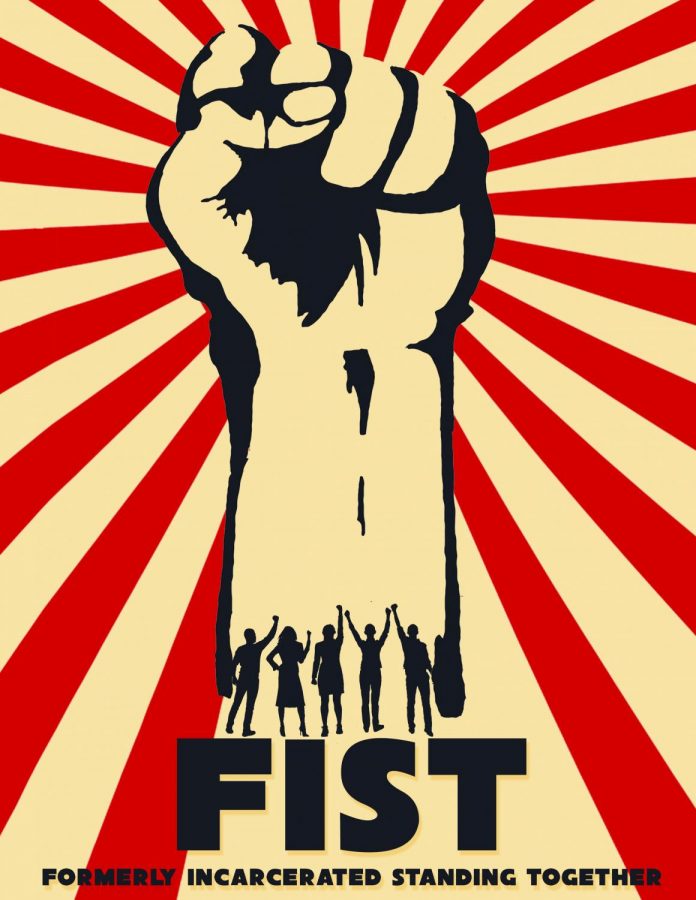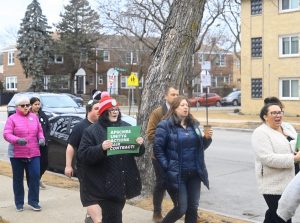FIST: Raising awareness for formerly incarcerated students
February 27, 2018
Formerly Incarcerated Standing Together (FIST) and The Justice Studies Club will be hosting NEIU’s Annual Day of Reflection on Mass Incarceration in the Student Union and Alumni Hall on March 5 from 10 a.m. to 4 p.m.
FIST is a club on campus that provides academic and social support for students who have been affected by mass incarceration, including formerly incarcerated students themselves.
President of FIST and senior student Michael Fischer, who was formerly incarcerated, said, “My biggest thing with the club is for people who have been incarcerated or whose family has been incarcerated to feel that NEIU is a place where they are going to be welcomed, where they are not going to be stigmatized. I want the presence of the club to send that message.”
Mass incarceration plays a large role in the social construct of the United States, with an incarceration rate five times higher than most countries in the world according to the Prison Policy Initiative.
President of The Justice Studies Club and senior student Ashlei Ross said, “It affects everyone, even if you don’t have family members that have been incarcerated. It affects our economy, our normal lives. A lot of people, because of the stigma, downplay it as if it’s not important but it really is.”
Secretary of FIST and sophomore student Maggie Speer said, “It affects everyone, without question.”
For those who are able to relate to the club directly, it can establish a sense of inclusion that is life-changing.
After Fischer got out of prison in 2015, he was looking to finish his degree. A Google search led him to NEIU’s FIST, which was part of the reason he decided to attend NEIU.
“I didn’t know at the time that [FIST] was dormant,” Fischer said. “I thought this would be a good place to go where I don’t have to be feel like I am this weird fish out of water, where there is a support system in place.
“I felt that this would be a welcoming space. It was the presence of this group that made me feel that way over a place like UIC,” he continued.
FIST is hoping the event on March 5 will gain them more exposure to the student body and the administration, who the people in FIST view as still resisting the presence of their club on campus.
Fischer said, “A lot of times you mention being locked up or you mention prison, and you can see everyone’s eyes getting big. That doesn’t bother me, I do it anyways. I actually say it because of that.”
Ross said, “We have The University Without Walls program where Stateville (Correctional Center) students take classes from here, and it was a very long haul to even get them to accept us giving current inmates college credit. I don’t think our administration has moved past that stigma. I think (the administration) wants to think, ‘great but let’s not talk about that. They are here, we know there is a club, we know they are here but let’s not highlight that.’”
FIST is hoping, by talking about incarceration issues that many students face, they are able to turn the campus into an inclusive and safe space for everyone.
Ross said, “I would like for a space where even if you haven’t been incarcerated, you know it is a safe place. You can come and you’ll have someone else to talk to about your problems.”
Fischer has witnessed this first hand. He said, “There is a weird understanding with people who have been through that in some way. Somebody emailed me, who was thinking about coming here and was incarcerated for 15 years. He reached out because he saw we had this club. I’m glad he thought there was someone here who was in a similar situation who he could talk to, because if you don’t see yourself reflected in a particular student body, you’re not going to want to join that student body.”
Email Professor Timothy Barnett at t-barnett1@neiu.edu for more information.








Student at neiu • Mar 2, 2018 at 10:31 pm
I am not a fan of mass incarceration. We should be careful on who we lock up. I believe that it’s awesome that someone went from being incarcerated to being a college student! I promote change! But why should we celebrate people who have been incarcerated. I don’t think being in prison is nothing to be proud of. Why should we allow a group like this at Neiu. What about all of the students who have never been incarcerated? Do we even know the type of crimes that some of these formerly incarcerated students have possibly committed in the past? I wouldn’t want to support people who have possibly murdered , raped, engage in child porn, or robbed. I believe in change! If someone wants to get an education that’s totally fine. I don’t think we should acknowledge a group like fist. If someone has psychological effects or trauma from being in prison they should go to the school counselor or psychological services for treatment.
Tim Barnett • Feb 28, 2018 at 1:10 pm
Thanks for the great article about FIST, the Justice Studies Club, and Monday’s Day of Reflection on Mass Incarceration. As faculty adviser for FIST and one of the faculty members responsible for bringing NEIU’s University Without Walls Program to Stateville Prison this year, I just wanted to clarify a few things. Our current administration, President Richard Helldobler and Special Assistant to the President Shelley Bannister, in particular, have been extremely supportive of the UWW initiative at Stateville. The College of Education has been a strong supporter of this initiative as well and has helped sponsor the Prison + Neighborhood Arts Project, which partnered with NEIU this year to bring classes to Stateville. President Helldobler attended our Day of Reflection on Mass Incarceration last year, and has been nothing but helpful as we have tried to increase awareness of incarceration issues on campus and support the incarcerated and formerly incarcerated. It is true that there was some student and faculty resistance to FIST when it was first proposed, and previous administrations were hesitant about supporting initiatives for the formerly incarcerated, but our current administration has been an ally in this regard, and I have appreciated their support tremendously.
There is no question that, as Ashlei and Michael mention in the article, there is often stigma associated with mass incarceration, and this is something our Day of Reflection on Mass Incarceration tries to address. It is also very difficult for university administrations to support every initiative presented to them since faculty, students, and staff have such varied ideas and interests and money is so limited. But I want to point out that my experience working with President Helldobler and the current administration around prison issues has been positive. Their work has helped make very difficult things–such as a BA program at Stateville Prison–possible when otherwise they may not have been.